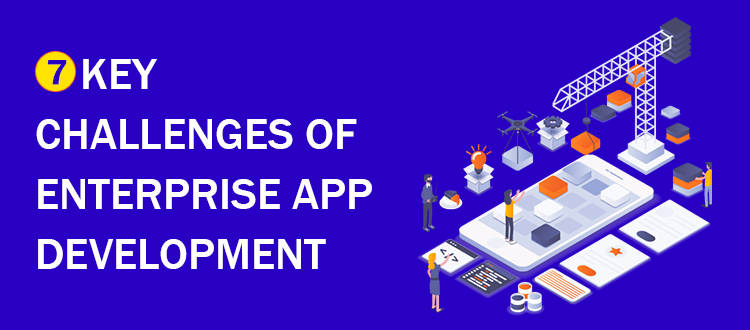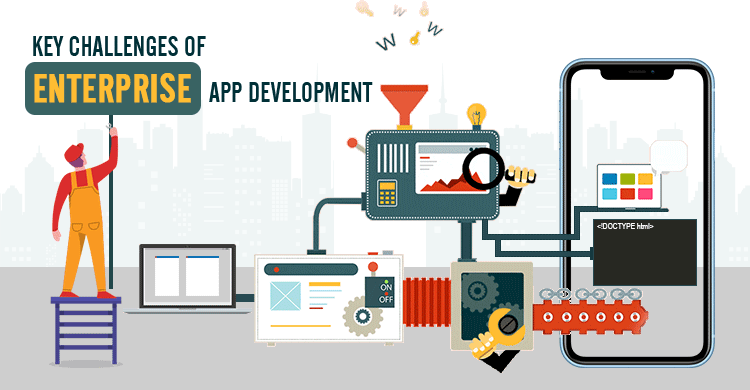You have come to the right place if you want to know how to hire dedicated app developers. Building an enterprise app needs to be done carefully, with many aspects in mind. Enterprise mobility has many benefits, and it should be the priority of a developer. According to a study, 67% of IT experts believe that it will have a significant impact on their business. Now, these apps can either be employee-facing or customer-facing.
Employee-facing apps focus on the workforce and other such operational parameters. Whereas customer-facing apps allow customers access to your brand. These apps simplify businesses and boost interaction and involvement among employees. Many mobile app development services focus on enterprise mobility for these reasons. But, there are many challenges we may face during it. So, here are seven critical challenges of enterprise development put together. Let us take a look at it.
1. Security
According to a study, 40% of the vulnerable apps come under the category of business apps. In enterprise mobility, there is always a risk of IP loss. Therefore, security is one of the most crucial challenges here. The BYOD concept has a lot to do with the recent increase in security breaches. BYOD is the short form for bringing your device. It lets employees get their phones and computers for work purposes.
• BYOD reduces the cost of business equipment, but most companies cannot prohibit it. It is because they cannot afford a security compromise. Thus, here are some statistics:
• 95% of employees use their devices for work purposes, and 41% of employees are not happy with the office tools
• 53% of US employees believe BYOD increases productivity
• 51% of companies abiding by BYOD have faced security breaches
• 31% of enterprises have reported violations in their confidential data
• 7% lost all the information from the enterprise apps
To curb the problems, developers use mobile app managing systems (MDM). Implementing MDM strategies is extremely useful. Company devices are always a better option, mainly because there is a smaller chance of security breaches. Furthermore, there is a limitation on what the employees can access on the phones—for example, no native apps, only whitelist apps, less functionality, and device locking.
Data encryption on smartphones is a huge challenge for enterprise apps. Because of BYOD, it is hard to keep the data encrypted on phones. The right solution for this problem is using a secure container that requires high authentication for access. When devices are lost or dead, you can retrieve the data from this place.
2. API Strategy
An API strategy is one of the critical challenges when it comes to enterprise app development. A considerable number of businesses need to invoke some actions instead of every single function. It is where APIs come into play. The main task is to create an API strategy during the planning of the app. For powering your app, APIs are vital to exposing the functions to allow specific actions.
For instance, a service app needs API for exposing the schedule of maintaining appointments and for users to close the complete meeting. Firms need to assess their APIs and decide if it takes care of the needs of the app. If not, then they must update the API or build new APIs from scratch.
The needs of enterprise apps are variable. Therefore, the person providing the solutions must be careful. API strategies need to be put into the product requirements. It is vital for the healthy functioning of the product, although it increases cost and effort.
3. Hiring Dedicated App Developers
Building an app is quite challenging and involves many things. It needs the work of many experts. Therefore, it is essential to hire dedicated app developers. An enterprise app needs a team of developers who can handle different areas. An ideal team consists of project managers, designers, developers, engineers, and testers.
If companies do not have such a team, they hire teams from outside. But it does not end there.
Deploying the work is not enough for developing an app. Companies must also show full involvement in the process, as it will provide a clear image of what is going on. Clear communication is crucial between the team and the employer. Here are some qualities you should look for while you hire dedicated web developers:
• Being well aware of the IT atmosphere
• Controlling every stage of the app development process without errors
• Knowing about the company’s functioning and procedures
• Learning about the app’s functions and tasks
Even after you hire dedicated App developers, they cannot have an accurate image of the company’s needs unless there is adequate guidance. It is the reason why someone from the inside needs to be there for supervision.
4. Maintenance and Support
The first step is gathering the resources and building the app. After building and successful A/B testing, launching the app is the next step. But, once the app is out, it is essential to maintain it. Apart from maintenance, regularly updating it and taking care of customer queries are two critical things.
Updating is essential to keep up with the latest technologies, issues, and activities. Customer support is equally important. You must ensure that the support staff is responsible enough to handle queries. If there is an error, and if a customer reports it, it must be immediately fixed. Because if the problem persists, the app will start getting negative feedback. Once the app starts getting such reviews, it will take a different toll on the company.
Therefore, maintaining the app and solving the problems are just as important as building and launching the app. The enterprise app’s success depends on how the app is running and how it improves after difficulties.
5. Data Accessing
In all online businesses, there is a humongous amount of data present. Having access to this data is crucial for mobile app development services. Providing data to the employees is essential for them. Employees must have access to this data at work and even if they are on vacation.
Taking an offline approach to development is a wise option. You will be able to access the data without the Internet, which will be a huge benefit. For instance, if an employee is on a remote island for a vacation, they won’t access the data if it online. It is because there are high chances of encountering network issues.
If the data is available offline, they can have full access to it, even if there is no range. However, apps must have massive storage for holding data that had its last update when the employer was online. Furthermore, it must be in sync with the backend data for making things easy for the employee.
6. Scalability
Most companies and mobile app development services want their apps to be scalable. It should be upgradeable for the rising technologies. Here are some of the emerging techs that are in trend:
• AI and ML
• AR and VR
There are a plethora of apps that widely use these technologies for functioning. It is only a matter of time before these techs enter our daily lives and help us even in the most manageable tasks. Therefore, it is essential for the apps that we are building to be compatible with them. It is a massive challenge for enterprise mobility to have apps to be scalable for testing them with the trends.
7. Usability Demands of Enterprise Applications
If you are short on resources, usability turns to be a huge issue. It harnesses the efficiency. Thus, it plays a massive role in determining it. An advantage of employee-facing apps is that we know about the audience who will be using the app. It also gives us the chance to get to know the workers and all staff better.
The best way to meet their demands would be conducting an internal survey. By doing it, you will quickly get an idea of what it is that they need. Here are some more things you will get to know after conducting:
• Every working role
• Requirements of every department
• Communication needs of employees
• Exact workflow issues where the app will help
Process of exchange of information
Developers and firms need to understand the needs of their workers. After knowing about it, they must match the app with the needs and make sure that it fills the gap. Although using the app can differ for employees, the app should work the same for everyone. The main objective of an enterprise app is to make work easy for all in the company.
What is the Solution to Enterprise App Development Challenges?
A collective answer would be creating a large enterprise app for the whole company. Select tasks that the employees need to access. Based on that, develop smaller mobile apps that will store specific data at the backend. Smaller apps will be simple to maintain, and if you want to upgrade to the latest tech, it will be effortless.
One thing to keep in mind here is to hire dedicated App developers and the right team. You can either hire freelancers or use mobile app development services. Additionally, you can even look for an in-house time for it. You can choose one among them considering the following factors:
• Size of your project
• Your budget
• For whom you need it (your own company or others)
Conclusion
Enterprise app development helps primarily in growing your business. It is a wise investment for improving efficiency and productivity in the workplace. It is equally crucial because building an app like that requires a team of experts who are good at what they do.

My name is Nicolas Thomas. I am Managing Director and Co-Founder of Indian App Developer, leading Software and Mobile App Development Company India. My ideology is that a clear vision and hard work build a great company. I started my career in Information and Technology 10 years back as a new-age Entrepreneur in emerging digital India.






